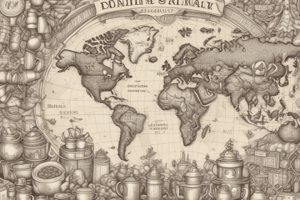Podcast
Questions and Answers
When, where, and by whom was coffee first reported being discovered?
When, where, and by whom was coffee first reported being discovered?
800-900 AD in Ethiopia by Kaldi and his goats
When was the first Starbucks store opened?
When was the first Starbucks store opened?
1971
What are the three coffee growing regions and their flavor profiles?
What are the three coffee growing regions and their flavor profiles?
Latin America: Cocoa, nuts, citrus, and high acidity; Asia/Pacific: Herbal and spicy; Africa: Citrus and floral
What is the growing cycle of a matured coffee tree?
What is the growing cycle of a matured coffee tree?
What are the three processing methods?
What are the three processing methods?
What does the Washed processing method look like?
What does the Washed processing method look like?
What does the Semi-Washed processing method look like?
What does the Semi-Washed processing method look like?
What does the Natural processing method look like?
What does the Natural processing method look like?
Why do we roast our coffees one at a time?
Why do we roast our coffees one at a time?
What are the four fundamentals of C.A.F.E practices?
What are the four fundamentals of C.A.F.E practices?
What are the most recognized species of coffee, and which one does Starbucks purchase?
What are the most recognized species of coffee, and which one does Starbucks purchase?
What are the differences between Arabica and Robusta coffee?
What are the differences between Arabica and Robusta coffee?
How do each processing methods impact the flavor of the coffee?
How do each processing methods impact the flavor of the coffee?
What is the Starbucks Shared Planet ethical sourcing goal?
What is the Starbucks Shared Planet ethical sourcing goal?
What is the purpose of our Farmer Support Centers (FSCs)?
What is the purpose of our Farmer Support Centers (FSCs)?
Flashcards are hidden until you start studying
Study Notes
Coffee Discovery and History
- Coffee was first reported discovered in 800-900 AD in Ethiopia by Kaldi and his goats.
- The first Starbucks store opened in 1971 in Seattle, Washington.
Coffee Growing Regions and Flavor Profiles
- Latin America: characterized by cocoa, nuts, citrus, and high acidity.
- Asia/Pacific: known for herbal and spicy flavors.
- Africa: features citrus and floral flavor notes.
Coffee Tree Growth Cycle
- Flowering: Coffee trees typically blossom once yearly.
- Ripening: After flowering, green cherries form, ripening to red; darker cherries indicate sweeter fruit and better bean quality.
- Harvesting: High elevation coffees require handpicking; lower elevation coffees may be machine-harvested.
Coffee Processing Methods
- Types: Washed, Semi-Washed, and Natural.
Washed Processing Method
- Receiving: Cherries are transferred to a wet mill, measured, and placed in tanks.
- De-pulping: Cherries are depulped via friction in washing channels.
- Fermentation: Beans ferment for 18-36 hours, enhancing the flavor profile.
- Drying: Beans are dried on patios, constantly raked for evenness, then bagged and rested for two months before hulling.
Semi-Washed Processing Method
- De-pulping: Cherries are cleaned and de-pulped using hand-cranked machines.
- Rinsing: Beans soak in water for 1-2 hours, rubbing off mucilage; some fruit remains for flavor.
- Continued Drying: Beans are dried with parchment on for 1-5 days after rinsing.
- Final Drying and Hulling: Beans are finally dried, sorted, hulled to remove residue.
Natural Processing Method
- Reception: Cherries are received at processing sites post-harvest.
- Drying: Cherries are spread on raised beds, ensuring proper drying without fermentation.
- Hulling: Dried cherries are hulled to remove all layers before sorting.
- Final Drying: Beans are fully dried before preparation for transport.
Coffee Roasting and Flavor Development
- Coffee is roasted one type at a time to develop distinct flavor profiles.
C.A.F.E Practices
- Four fundamentals include Product Quality, Economic Accountability, Social Responsibility, and Environmental Leadership.
Coffee Species
- The two recognized species are Arabica and Robusta; Starbucks exclusively purchases Arabica coffee.
Arabica vs. Robusta
- Arabica accounts for 60% of production, while Robusta accounts for 40%.
- Arabica grows better at high altitudes with lower yields; Robusta thrives at lower altitudes with higher yields.
- Arabica has a refined flavor and lower caffeine (1%) compared to Robusta (2%).
- Arabica is more prone to disease, while Robusta is hardier.
Impact of Processing Methods on Flavor
- Washed processing enhances acidity; Semi-Washed produces lower acidity and a fuller body; Natural processing adds berry flavor notes.
Starbucks Shared Planet Initiative
- The goal is for all Starbucks coffee to be certified or verified by a third party by 2015.
Farmer Support Centers (FSCs)
- FSCs provide resources for farmers in origin countries to promote responsible growing methods.
Studying That Suits You
Use AI to generate personalized quizzes and flashcards to suit your learning preferences.




